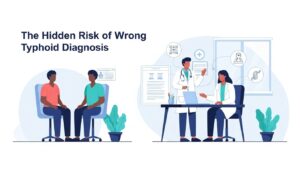What is PCOS?
Grasping the Fundamentals Polycystic Ovary Syndrome (PCOS) is a widespread hormonal condition that impacts millions of women in their reproductive years. Despite its common occurrence, many women find it difficult to comprehend PCOS, identify its symptoms, and determine effective management strategies. At Well-Life Hospital, we are dedicated to equipping women with knowledge and practical solutions for improved health.
Underlying Factors for PCOS
PCOS is multifaceted, and the precise reason for its occurrence is still unknown. Nonetheless, a number of essential elements play a role in its development:
- Hormonal Imbalance: Women diagnosed with PCOS frequently exhibit elevated levels of androgens (male hormones) and insulin, leading to disruption of normal ovarian function.
- Genetics: The familial occurrence of PCOS suggests a genetic connection.
- Insulin Resistance: Many women with PCOS have trouble using insulin effectively, leading to higher blood sugar levels and increased androgen production.
These elements come together to result in irregular ovulation, which is characteristic of PCOS.
Identifying PCOS Symptoms
The symptoms of PCOS can differ greatly, which complicates diagnosis. Typical indications include:
- Skipped or irregular menstrual cycles
- Abnormal hair growth on the face, chest, or back (hirsutism)
- Skin issues like acne or oiliness
- Hair loss or balding typical of men
- Increased weight, particularly in the abdominal area
- Challenges with conception (sterility)
- Skin discoloration, particularly on the neck or in the armpit area
- Numerous tiny ovarian cysts (detectable with ultrasound)
Not all women experience all of these symptoms; some may only notice subtle changes, while others encounter significant challenges.
True Story:
Ada, who was a teacher at 28 years old, observed that her menstrual cycles were becoming less frequent and that she was having difficulty with persistent acne. She attributed these issues to stress. It wasn’t until she visited Well-Life Hospital for a routine checkup that she learned about PCOS-a diagnosis that finally explained her symptoms and set her on the path to better health.
The Connection Between Hormonal Imbalance and PCOS
Hormonal imbalance plays a key role in PCOS. High levels of androgens disrupt menstrual cycles, lead to excessive hair growth, and contribute to acne and thinning scalp hair. Insulin resistance can exacerbate these symptoms and increase the risk of type 2 diabetes, hypertension, and heart disease. Did you know? PCOS is among the top causes of infertility in women, but with appropriate support, many women achieve healthy pregnancies
How is Polycystic Ovary Syndrome(PCOS) Diagnosed?
The diagnosis usually includes a combination of:
- Reviewing medical history and symptoms
- Conducting a physical examination
- Performing blood tests to assess hormone levels
- Carrying out a pelvic ultrasound to detect ovarian cysts
Doctors look for at least two of the following :
Irregular menstrual cycles signs of excess androgen, and polycystic ovaries on ultrasound.
Managing PCOS: Practical Steps for Better Health
Living with PCOS can be tough, but effective management is achievable. Here’s how you can take charge:
- Lifestyle Changes Nutritious Diet: Concentrate on a balanced eating regimen that includes whole grains, lean protein sources, fruits, and vegetables. Cutting back on processed foods and sugar aids in controlling insulin levels. Consistent Exercise: Working out enhances insulin sensitivity, assists with weight control, and lifts mood.
Weight Management: Modest reductions in weight (5-10% of body weight) can aid in period regulation and decrease PCOS symptoms.
- Medical Treatments Birth Control Pills: Assist in regulating menstrual cycles, lowering androgen levels, and addressing acne and excessive hair growth6. Anti-Androgens: Drugs that decrease androgen levels, alleviating symptoms such as hirsutism and acne.
Insulin-Sensitizing Agents: Such as metformin, which help the body use insulin more effectively.
Fertility Treatments: For women trying to conceive, options include ovulation induction medications and assisted reproductive technologies
3. Support for Emotional and Mental Well-Being
Polycystic Ovary Syndrome (PCOS) can affect mental health and self-esteem. Joining support groups, seeking counseling, and having candid discussions with medical professionals can significantly help.
Actionable Insights: Strategies for Flourishing with PCOS
Monitor Your Cycle: Keep track of symptoms and cycles using a journal or application. Collaborate with Experts: Routine examinations by women’s health specialists, such as those at Well-Life Hospital, confirm you’re on the right path.
Stay Educated: Trustworthy resources and continuous learning enable you to make informed decisions regarding your health.
Why Opt for Well-Life Hospital for PCOS Treatment?
At Well-Life Hospital, we recognize that each woman’s experience with PCOS is distinct. Our offerings include:
- Skilled diagnosis and tailored treatment approaches
- Empathetic counseling and assistance
- State-of-the-art gynecological services and fertility treatments
- education via our articles and resources
We are dedicated to assisting you in reaching your reproductive and general health objectives.
Conclusion: Assume Control of Your Health Today
While PCOS is a lifelong condition, you can manage its symptoms and lead a vibrant, healthy life with the right knowledge and support. Should you notice any symptoms of Polycystic Ovary Syndrome (PCOS) or have ongoing worries about hormonal imbalance, don’t delay—contact the compassionate experts at Well-Life Hospital.
Prepared to advance to the next step?
Pay Well-Life Hospital a visit to gather more information, arrange for a consultation, or check out our newest resources related to women’s health. Your well-being is our priority-let’s thrive together!






